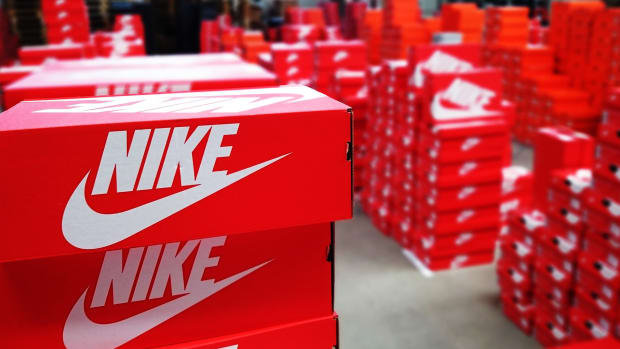Nike (NKE) does not intend to share the poster with its competitors in the metaverse, the latest buzzword in the tech world.
The brand, which is recruiting talent to boost and bolster its image in this virtual world, has just sent a scathing warning to anyone who still doubted it: The company will not hesitate to go out of its way for anyone who threatens its position. StockX, the Detroit-based sneaker exchange just found out the hard way.
Nike has filed a complaint against the sneakers exchange which it accuses of having infringed on its patents by marketing non-fungible tokens (NFTs) of its sneakers. The company is saying that StockX has been selling unauthorized images of its shoes as NFTs.
Nike also claims, in its complaint, that StockX offers a range of products likely to confuse consumers.
"StockX’s use of Nike’s trademarks and images of Nike’s products to promote its Vault NFTs has already created confusion in the marketplace as to the Vault NFTs’ source and whether Nike is in any way involved or associated with StockX’s Vault NFTs," accused the company in its lawsuit. "For example, immediately after StockX announced the Vault NFTs’ release, on January 18, 2022, users on social media questioned the propriety of StockX’s Vault NFTs and whether Nike is 'in on it too,' while others 'feel safe assuming Nike gets a cut of the fees that StockX takes from each transaction.”
Is StockX Misleading Consumers?
At issue here is the fact that, last month, StockX pioneered the Vault NFTs concept around the combination of physical products and NFT. The collection links a digital token that users can trade with each other on actual sneakers: users can purchase NFTs of popular collectible sneakers that are backed by a physical pair of shoes. Owners can then redeem their NFTs for a physical pair of sneakers if they wish to do so.
"So if you’re bullish on a shoe, consider investing in a Vault NFT. You take possession of the NFT immediately after the transaction is complete, meaning it is the fastest way to flip. And with no shipping costs, and market-leading low seller fees at a fraction of the cost, there’s a lower hurdle for profitability," StockX explained when it launched the product.
But Nike is not having it.
"To date, upon information and belief, StockX has sold 558 individual Nike-branded Vault NFTs," Nike wrote in its lawsuit. "Given that StockX is not an authorized Nike retailer, to the extent corresponding physical Nike shoes exist at StockX’s “vault” facility, it is not clear where or how StockX acquired that many pairs of Nike shoes," the company blasted.
Adding: "StockX also touts each Vault NFTs as '100% Authentic,' which, upon information and belief, is intended to explicitly mislead consumers that Nike has authorized, approved, sponsored, and/or endorsed StockX’s Vault NFTs."

Image source: Shutterstock
Nike Owns Its Own Virtual Sneaker Company
StockX is built on the mechanics of the stock market to provide buyers with seamless access to in-demand products. The company, a mainstay of online fashion and the latest sports and street fashion, has indicated that the physical items that trade on its platform are part of a new alternative asset class that can be uniquely associated with NFTs. Each edition of Vault NFT is uniquely serialized for a product authenticated as a title deed.
It is this principle that Nike, which recently bought RTFKT, a company that specializes in making virtual sneakers, attacks.
The "Vault NFT is merely supposed to function as a 'digital receipt' for a physical Nike shoe, there is no legitimate reason for StockX to prominently feature Nike’s trademarks on the Vault NFT and the StockX product page. Indeed, when a consumer purchases Nike shoes from the StockX marketplace, the consumer receives a paper receipt from StockX in the package. Unlike a Vault NFT, upon information and belief, this paper receipt prominently uses StockX’s own mark and only uses the Nike name in connection with the purchased shoe, yet somehow still manages to function as a receipt for that Nike shoe."
Therefore, Nike asks the court for "an order that StockX be required to deliver to Nike for destruction any and all Vault NFTs, associated footwear, digital files, packaging, printed graphics, promotional materials, business cards, signs, labels, advertisements, flyers, circulars, and any other items in any of their possession, custody, or control bearing Nike’s Asserted Marks, any marks substantially indistinguishable therefrom, confusingly similar marks."
The lawsuit was filed in federal court in New York and Nike is also seeking unspecified monetary damages.
StockX did not immediately respond to a request for comment.
Can Nike Stop "unauthorized" NFTs?
The explosion and popularity of digital objects, especially NFTs, and their value have become a headache for lawyers. Nike's complaint will test intellectual property rights, experts say. In other words, what constitutes patent infringement or not in the emerging, decentralized and unregulated world of NFTs?
“One thing is clear, though: use of a copyrighted work in a commercial manner requires permission from the party or parties that own or control that copyright,” Andy Lee, of the law firm Foley & Lardner, which has an NFT Task Force, recently told TheStreet's Michael Tedder.







